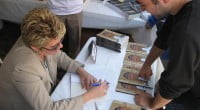Fethullah Gülen’s response to the ‘clash of civilizations’ thesis

Date posted: October 30, 2007
RICHARD PENASKOVIC*
If Mr. Huntington is a protagonist for Western civilization, then Mr. Gülen is his counterpart, serving as a spokesperson or champion for moderate Islam.
The differences between them are like night and day. Mr. Gülen argues that by creating new enemy fronts, Huntington actually sows the seeds for a clash of civilizations on the basis of cultural and religious differences. Moreover, in contradistinction to Huntington, Gülen comes out strongly in favor of a rapprochement between Islam and the West based on his understanding of tolerance, interfaith dialogue and compassionate love.
What does Gülen say about the clash of civilizations? Gülen does not mince words. He fears that such talk about a clash of civilizations might become a self-fulfilling prophecy. Gülen notes that as a consequence of such a claim, readers may form expectations in the very same way they expect an answer to prayers. By arguing that the future will involve a clash of civilizations, Huntington converts such an expectation into a purposeful goal. Gülen fears that with such a goal in mind, various policies and strategies will then be marshaled to reach and attain such a goal.
In contradistinction to Huntington Mr. Gülen notes that no religion has ever been based on conflict. In the early centuries of Christianity war was condemned and many Christians were pacifists, e.g., Tertullian. From time immemorial Christianity did not lay down any rules regarding war until St. Augustine in the fourth century elaborated the just war theory. The Islamic religion has likewise been based on peace, world harmony and security.
Gülen’s positive response to the clash of civilizations thesis consists of three parts encapsulated in the words tolerance, interfaith dialogue and compassionate love.
Gülen finds the notion of tolerance and forgiveness deeply rooted in the Quran and sunnah, the customs/traditions of Mohammed (Quran 25:63; 25:72; 28:55). The servants of God say nothing unbecoming when they have ugly words thrown in their face. They also know how to ignore ugly or bad behavior. They take the high road bypassing negativity by acing with dignity. Gülen calls such people “heroes of tolerance.”
Gülen exhorts all of us to pull together to construct a better world built on tolerance. His optimistic and hopeful view of the future leads him to say that the 21st century will be called the age of tolerance. And he wants this tolerance to become permanent, that is, to last for all ages.
Gülen remains convinced that interfaith dialogue is sorely needed in today’s world, one which is torn apart by conflict. Dialogue for him means the coming together of two or more persons to discuss common issues. In the process of dialogue, the partners form a close bond. Gülen argues that the very nature of religion demands a dialogue between all the major world religions. This dialogue has particular urgency for the three Abrahamic religions: Judaism, Islam and Christianity.
Gülen speaks forcefully about the power of compassionate love. This notion of compassionate love appears in many of Gülen’s writings and sermons. Gülen considers the love of God to be the purest source of compassionate love in the world. On the individual level we may call compassionate love the sultan that reigns on the throne of the human heart. On the social level there exists nothing more real or more lasting than love in any nation or society. Gülen waxes poetically in speaking of love describing it as the most radiant light, the greatest power in the world, and the chain or link that binds one person to another. For Gülen it is axiomatic that our love should be as vast as the ocean and we should take every soul to our bosom.
These three entities — tolerance, interfaith dialogue and compassionate love — are Gülen’s positive response to Huntington’s clash of civilizations thesis. Where Huntington sees conflict, Gülen sees peace. Where Huntington has a decidedly pessimistic view of the relationship between Islam and the West, Gülen speaks of hope and optimism. How do we account for the difference between the two perspectives? My answer would be this: If Huntington views the world as a political scientist, Gülen looks upon the same world through the lens of his Muslim faith.
There are several practical implications to what Gülen proposes. First, one must distinguish between Islam as a religion and global Islamism which is a political ideology dressed in religious imagery and apocalyptical language. As a religion Islam stands for tolerance, peace, dialogue and compassionate love. However, ideologically, global Islamism is decidedly similar to secular ideologies of terror such as Leninism, the Baader-Meinhof Gang and the Red Brigades, who were prepared to unleash violence against their own people.
Second, Gülen would remind us that if we want to start a revolution, we must begin with ourselves. We must eliminate from our vocabulary such words as “hatred,” “enemy” and “revenge.” Rather than striking back at others, we must “retaliate” against others using gentleness and forgiveness as our modus operandi. We are called, says Gülen, to reach out in love to others with whom we interact on a daily basis. Thus we will be agents of change within our own circle of friends. In this way we will bridge the gap between Islam and the West in an infinitely small but important way.
The differences between Huntington and Gülen are stark. Where Huntington thinks in terms of polarities, Islam or the West in conflict with one another, Gülen opts for a more holistic view of global politics. Gülen sees Islam and the West working together in a harmonious fashion. In this connection, the operative term for Gülen is dialogue. I would also point out that Huntington as a representative of the Western mindset takes a wholly secular view of global politics. Gülen, on the contrary, takes a transcendent point of view; that is, he looks at global politics through the lens of his Islamic faith.
Here I raise the question “Where does the truth lie?” Will there be a clash of civilizations as Huntington suggests or should we look forward in the 21st century to a “dialogue of civilizations,” that is, to a more hopeful view of global politics in accordance with the vision of Gülen? My sympathies are decidedly much more in alignment with those of Gülen.
* Richard Penaskovic is professor of religious studies at Auburn University in Alabama, US.
Source: Today's Zaman , October 30, 2007
Tags: Fethullah Gulen | Hizmet (Gulen) movement |
























